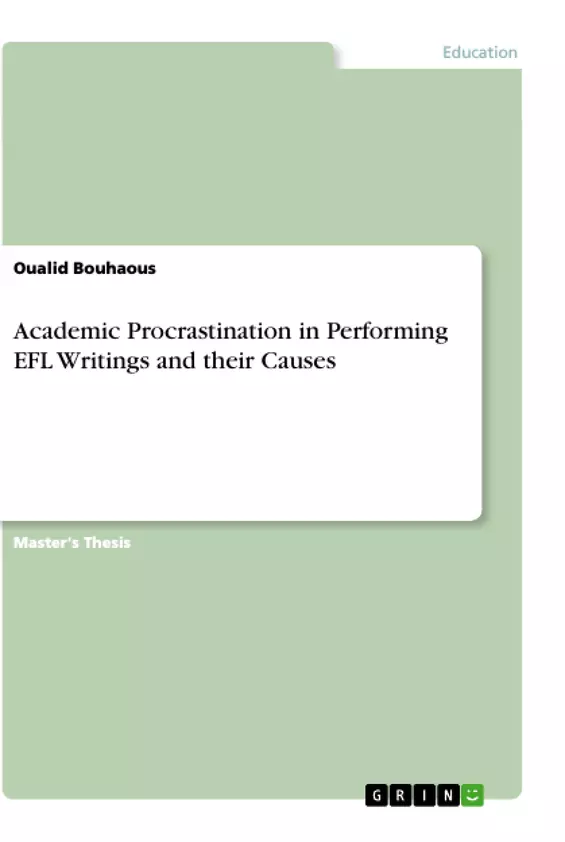The purpose of this study is to highlight the causes that lead students to procrastinate, to see how these causes affect students’ writing, and to seek how can we find ways to limit its negative impact so students can have better achievement on their written tasks. The aims of the study at first is to demonstrate the effective strategies of writing so the students can follow and solve the problems they face during the writing process. Then, highlighting the importance of both time management and self-regulation in improving the writing skills. In other words, the aim is to show that students who manage their time and succeed in being self-regulated are going to reach higher levels of academic achievement. Lastly, we aim to suggest some tips and recommendation about overcoming the academic procrastination by showcasing the impact of time management which can help our students to reduce their procrastination habits.
The target subjects are Master 2 students at the department of English at Ibn Khaldoun University of Tiaret. To reach this aim, this investigation is based on a relevant literature and on data collected through a mixed methodology based on both quantitative and qualitative methods.
The quantitative method is presented as email questionnaire and the qualitative consisted of an email interview.
Inhaltsverzeichnis (Table of Contents)
- Dedication
- Acknowledgements
- Abstract
- Table of content
- List of Tables
- List of Figures
- List of Abbreviations
- Glossary of Terms
- I. Sources of Inspiration
- General introduction
- II. Statement of the Problem and Research Questions
- III. Hypothesis
- IV. Aims of the Study
- V. Methodology
- VI. Significance of the Study
- VII. The Organisation of the Work
- Chapter one
- A Brief Overview about Academic Procrastination in EFL Writing
- 1.1 Introduction
- Section 01: Introducing Procrastination
- 1.1.1. Definition of Procrastination
- 1.1.2. Types of Procrastinators
- 1.1.3. Main Theories of Procrastination
- 1.1.3.1. Natural Instinct Theories
- 1.1.3.2. Behaviouristic Theories
- 1.1.3.3. Cognitive Theories
- 1.1.3.4. Personality Traits
- 1.1.3.5. Time Management Theories
- Section 02: Theoretical Background on Academic procrastination and EFL Writing
- 1.2.1. Definition of Academic Procrastination
- 1.2.2. Characteristics of Academic Procrastination
- 1.2.2.1. Psychological Beliefs About Abilities
Zielsetzung und Themenschwerpunkte (Objectives and Key Themes)
This dissertation investigates the causes of academic procrastination in performing EFL writing tasks among Master 2 students at the English Department of Ibn Khaldoun University of Tiaret. Using a mixed methodology, the study aims to understand the factors contributing to procrastination among these students and to identify possible solutions to overcome this issue.
- Causes of academic procrastination in EFL writing
- The impact of procrastination on EFL writing performance
- Strategies for overcoming academic procrastination
- The role of self-regulation and time management in academic procrastination
- The relationship between anxiety and procrastination
Zusammenfassung der Kapitel (Chapter Summaries)
The dissertation begins with a general introduction, outlining the research problem, questions, hypothesis, aims, methodology, significance, and organization of the work. Chapter one delves into a comprehensive overview of academic procrastination in EFL writing, defining procrastination, examining types of procrastinators, and exploring various theories of procrastination. It also defines academic procrastination and discusses its characteristics, particularly focusing on psychological beliefs about abilities. The study goes on to analyze data gathered through a mixed methodology, employing both quantitative and qualitative methods, such as email questionnaires and email interviews. The findings will be analyzed to explore the causes and impact of procrastination on EFL writing performance, and offer potential solutions.
Schlüsselwörter (Keywords)
The key keywords and focus topics of the dissertation include: academic procrastination, EFL writing, writing process, anxiety, poor time management, lack of self-regulation, procrastination theories, and strategies for overcoming procrastination. The dissertation seeks to shed light on the complex relationship between academic procrastination and EFL writing, offering a deeper understanding of the challenges faced by Master 2 students and providing valuable insights for educators and researchers in the field of English language teaching.
- Citation du texte
- Oualid Bouhaous (Auteur), 2019, Academic Procrastination in Performing EFL Writings and their Causes, Munich, GRIN Verlag, https://www.grin.com/document/1036025



